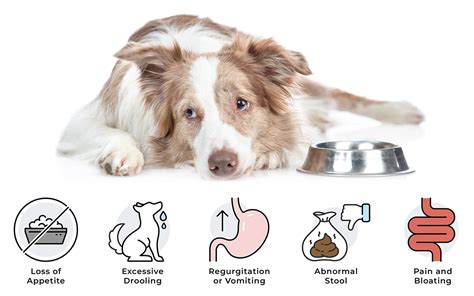Gastrointestinal (GI) issues are a common complaint among pet owners, and they can range from minor annoyances to life-threatening conditions. In fact, according to the American Veterinary Medical Association (AVMA), nearly 20% of all veterinary visits are related to digestive problems.

While some digestive issues can be easily treated at home, others may require professional medical attention. It is important to be aware of the signs and symptoms of common pet digestive issues so that you can seek veterinary care if necessary.
1. Vomiting
Vomiting is a common symptom of many different digestive issues in pets. It can be caused by anything from eating something toxic to a more serious underlying medical condition.
Signs and symptoms of vomiting in pets:
- Vomiting up food or liquid
- Retching or gagging
- Loss of appetite
- Lethargy
- Abdominal pain
Causes of vomiting in pets:
- Eating something toxic
- Infection
- Inflammatory bowel disease (IBD)
- Cancer
- Kidney disease
- Liver disease
- Pancreatitis
2. Diarrhea
Diarrhea is another common symptom of many different digestive issues in pets. It can be caused by anything from a change in diet to a more serious underlying medical condition.
Signs and symptoms of diarrhea in pets:
- Loose, watery stools
- Frequent bowel movements
- Urgency to defecate
- Straining to defecate
- Blood or mucus in the stool
Causes of diarrhea in pets:
- Change in diet
- Infection
- Inflammatory bowel disease (IBD)
- Cancer
- Kidney disease
- Liver disease
- Pancreatitis
3. Constipation
Constipation is a condition in which pets have difficulty passing stools. It can be caused by anything from a lack of fiber in the diet to a more serious underlying medical condition.
Signs and symptoms of constipation in pets:
- Hard, dry stools
- Straining to defecate
- Infrequent bowel movements
- Abdominal pain
Causes of constipation in pets:
- Lack of fiber in the diet
- Dehydration
- Bowel obstruction
- Inflammatory bowel disease (IBD)
- Cancer
- Kidney disease
- Liver disease
- Pancreatitis
4. Flatulence
Flatulence is a condition in which pets pass gas excessively. It can be caused by anything from eating a gas-producing food to a more serious underlying medical condition.
Signs and symptoms of flatulence in pets:
- Passing gas excessively
- Abdominal bloating
- Abdominal pain
Causes of flatulence in pets:
- Eating a gas-producing food
- Inflammatory bowel disease (IBD)
- Cancer
- Kidney disease
- Liver disease
- Pancreatitis
5. Abdominal pain
Abdominal pain is a common symptom of many different digestive issues in pets. It can be caused by anything from eating something indigestible to a more serious underlying medical condition.
Signs and symptoms of abdominal pain in pets:
- Crying or whining
- Pacing or restlessness
- Tucking the tail under the body
- Lying down in a hunched position
- Refusing to eat or drink
Causes of abdominal pain in pets:
- Eating something indigestible
- Inflammation
- Infection
- Bowel obstruction
- Cancer
- Kidney disease
- Liver disease
- Pancreatitis
6. Weight loss
Weight loss can be a sign of a number of different digestive issues in pets. It can be caused by anything from a lack of appetite to a more serious underlying medical condition.
Signs and symptoms of weight loss in pets:
- Loss of weight
- Loss of muscle mass
- Poor appetite
- Lethargy
- Weakness
Causes of weight loss in pets:
- Lack of appetite
- Inflammation
- Infection
- Cancer
- Kidney disease
- Liver disease
- Pancreatitis
- Hyperthyroidism
- Diabetes
7. Changes in appetite
Changes in appetite can be a sign of a number of different digestive issues in pets. It can be caused by anything from a change in diet to a more serious underlying medical condition.
Signs and symptoms of changes in appetite in pets:
- Loss of appetite
- Increased appetite
- Eating unusual things
- Refusing to eat
Causes of changes in appetite in pets:
- Change in diet
- Inflammation
- Infection
- Cancer
- Kidney disease
- Liver disease
- Pancreatitis
- Hyperthyroidism
- Diabetes
When to Seek Veterinary Care
It is important to seek veterinary care if your pet is experiencing any of the signs and symptoms of a digestive issue. Early diagnosis and treatment can help to improve your pet’s prognosis.
Treatment
The treatment for a digestive issue will depend on the underlying cause. In some cases, simple dietary changes may be enough to resolve the problem. In other cases, more aggressive treatment, such as surgery or medication, may be necessary.
Prevention
There are a number of things you can do to help prevent digestive issues in your pet. These include:
- Feeding your pet a healthy diet
- Providing your pet with plenty of fresh water
- Exercising your pet regularly
- Maintaining a healthy weight for your pet
- Avoiding giving your pet table scraps
- Keeping your pet up-to-date on vaccinations
Conclusion
Digestive issues are a common problem in pets, but they can be managed with proper care. By being aware of the signs and symptoms of digestive issues, you can help your pet get the treatment they need to stay healthy and happy.





















